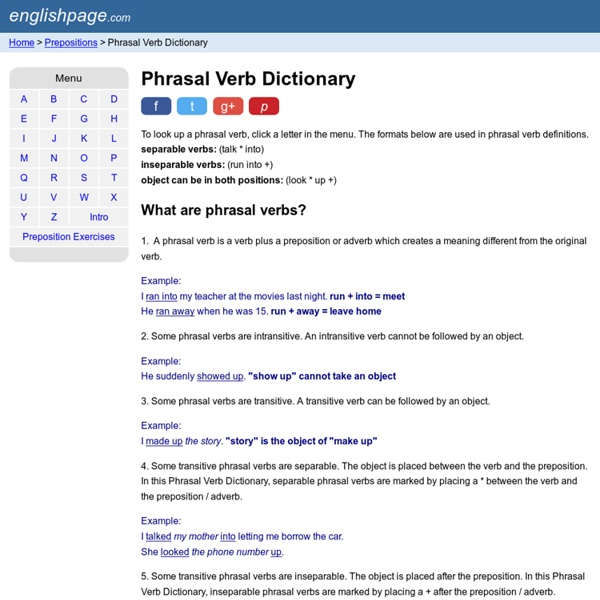Make or Do Quiz
The choice between 'make' or 'do' is difficult in English. There are many set phrases in English with 'make' or 'do' such as 'make money', or 'do the laundry'. The main difference between the two verbs is that 'make' is used with physical objects such as 'make a cup of tea' and 'do' is used with activities, tasks, chores, etc. However, there are many exceptions to the rule. Take the quiz to test your knowledge of some of the most important combinations.
Phrasal Verb Demon. Complete guide to phrasal verbs. Phrasal Verb Dictionary
Home > Phrasal Verb Dictionary: Letter R Rack up [Rack something up].- (losses, sales, points, titles) When you rack something up, it gradually increases in number or ammount. Japanese athletes racked up only two medals in Salt Lake City. Most biotech companies are still racking up losses. You may begin racking up points as soon as your membership is approved.
The English Blog
Student Stella asks: how can I learn new words in English ??? Here is the answer Stella – it has been proven by scientists. Put new vocabulary in your long-term memory forever! A new English word is causing a lot of media buzz right now – YUMMIES. Find out everything you need to know about this latest vocabulary in English. A true English short story about a crime, text messages and Shakespeare!
Picture Dictionary
Rating: 3.8/5 (127 votes cast) Opposites Words Picture Dictionary by Subject Animals Animals
Vocabulary: teaching make and do
By Jonathan Marks Advice and teaching suggestions of how to overcome the confusion between 'make' and 'do.' I live and work in the Dominican Republic, where Spanish is the native language. With almost all of my English students, I encounter a confusion between the use of "to make" and "to do", most probably because in Spanish one verb - hacer- covers both actions.
Phrasal verbs
Phrasal verbs (to) eat away: roer, carcomer, corroer, desgastar. (to) eat into: corroer, comerse. (to) eat out: comer fuera, cenar fuera. (to) eat up: comerse, consumir, tragar, devorar. (to) egg on: animar, incitar.
Leçon d'anglais > Les préfixes et les suffixes
Les préfixes et les suffixes 1. Les préfixes
Cops block Wall Street protesters: News24: World: News
New York - Hundreds of people marched on Saturday near Wall Street in New York in a failed attempt to occupy the heart of global finance to protest greed, corruption and budget cuts. Plans by protesters to turn Lower Manhattan into an "American Tahrir Square" was thwarted when police blocked all the streets near the New York Stock Exchange and Federal Hall in Lower Manhattan. The demonstrators had planned to stake out Wall Street until their anger over a financial system they say favours the rich and powerful was heard. "The one thing we all have in common is that We Are The 99 Percent that will no longer tolerate the greed and corruption of the one percent," said a statement on the website Occupy Wall Street. By noon, about 700 people, many carrying backpacks and sleeping bags, had gathered near Wall Street to search for a place to camp amid a heavy police presence. Righteous indignation
You said what? An Unplugged Grammar Review of Question Formation, “memory and mingle”.
A designer lessons ESL lesson plan developed by George Chilton No-one expects the Spanish inquisition. This is a zero-prep unplugged review lesson aimed at reviewing question formation.
English Phrasal Verbs
A reference of 3,429 current English Phrasal Verbs (also called multi-word verbs) with definitions and examples. If you have a question about phrasal verbs, ask us about it in our English Phrasal Verbs Forum. Subscribe
CLEVER DICTIONARY
Clever Dictionary consists of nine powerful modes seamlessly integrated into a single, intuitive interface; literally giving you access to millions and millions of word combinations as an offline wordsmith resource. The modes include: – 1.
Past Simple or Present Perfect 1
Choose the past simple or the present perfect. Click here to review how to make the past simple.Click here to review how to make the present perfect.Click here to return to the list of English grammar exercises.Download this exercise in PDF.Need more exercises? Try Perfect English Grammar Plus! Click here to learn more. Change the verb into the correct form of the past simple or present perfect
English Grammar Pill: How to use the future tenses correctly
Many of you will know that I am a huge fan of mind maps and infographics. I think they are a colourful and imaginative way of showing language points whether they are grammar or lexis. I haven’t had the time to create my own mind maps, however I have made good use of the excellent resources available from my creative fellow teachers to help me with my posts.
Grammar: differences between could and can
By Jonathan Marks An article discussing the differences between 'could' and 'can' when expressing possibility. How can I explain the difference between 'could' and 'can' when expressing possibility? Most of the time it is clear from the context, but use of can can also express possibility (rather than ability). For example, giving advice answering the question: How can/could I improve my English? You can/could listen to the radio, watch TV and read the newspaper.



